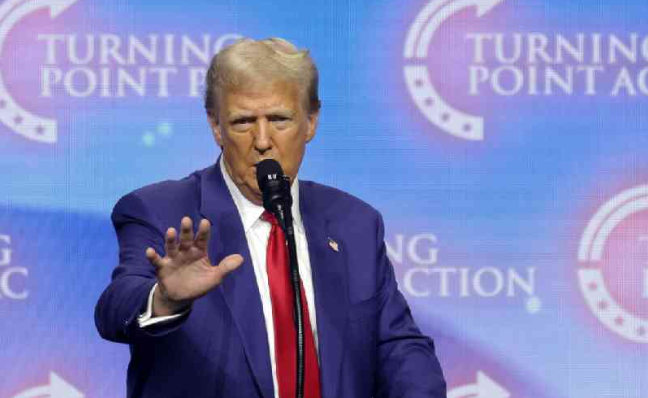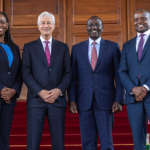Crown Prince Mohammed bin Salman of Saudi Arabia is positioning himself for a potential close relationship with the White House if Donald Trump is re-elected in the upcoming elections. While he anticipates warm personal ties with Trump, the prince is also wary of the unpredictability that comes with the former president, especially amid ongoing tensions in the Middle East and the uncertain fate of a potential “mega-deal” that could recognize Israel.
Analysts suggest that the Crown Prince recognizes the advantages of a Trump administration, as Trump is expected to be more supportive of Saudi interests and less critical of the kingdom compared to President Joe Biden.
Dina Esfandiary from the International Crisis Group noted, “I think, broadly, the Saudis are keener for a Trump victory. On the surface, he will be more supportive of them and less critical of them. But they worry what are some of the out-of-left-field things he might do?”
During Trump’s presidency, he made his first overseas trip to Riyadh in 2017, where he was greeted with an elaborate welcome, including a sword dance and a flyover of military jets. However, the relationship later soured, particularly after Prince Mohammed felt Trump did not respond robustly enough to a 2019 attack on Saudi oil facilities, which was attributed to Iran and significantly affected the kingdom’s oil output.
With the current geopolitical landscape in flux, the Crown Prince is navigating the complexities of U.S.-Saudi relations, weighing the benefits of a Trump presidency against the potential risks that come with his unpredictability. Meanwhile, should Vice President Kamala Harris win, the Crown Prince believes he can work with her, given the recovery in relations with the Biden administration after an initial period of tension.
Biden has taken the opposite trajectory, initially vowing to make Saudi Arabia “a pariah” before diving into talks to deepen ties in exchange for Riyadh’s recognition of Israel.
The Gaza war has put the deal on ice, but one result of Biden’s about-face is the Saudis would now be “equally comfortable” with either Trump or Vice President Kamala Harris in office, said Ali Shihabi, a Saudi analyst close to the government.
“They have a good relationship with Trump and a high level of access to him, while at the same time they now have an excellent relationship with the Biden-Harris administration and see no reason why that would change with Kamala,” Shihabi said.
“It’s a rare moment when they really are OK with either party winning.”
Biden’s change of heart
Russia’s invasion of Ukraine in February 2022 sent energy prices soaring, reinforcing Saudi Arabia’s clout as a major Middle East power and the world’s biggest crude oil exporter.
In July of that year Biden flew to Saudi Arabia for a fist-bump and meeting with Prince Mohammed, a controversial climbdown after lambasting the kingdom for the 2018 killing of Saudi journalist Jamal Khashoggi.
Soon the two sides were hashing out the contours of an agreement in which Saudi Arabia would recognise Israel in exchange for a defence pact with the United States and help on a civilian nuclear programme.
SIGN UP
That drove home the notion that both Democrats and Republicans are prepared to work closely with Saudi Arabia, said Aziz Alghashian, senior fellow at Observer Research Foundation Middle East.
“I think Biden is the epitome of this because he came in with such strong anti-Saudi rhetoric,” Alghashian said.
Both US candidates would likely be keen to press talks on the deal, though its fate would hinge on gaining the approval of lawmakers.
“Whether it’s Trump or Harris (in the White House) matters less,” Esfandiary said.
– The trouble with Trump –
Under Biden, Saudi Arabia has altered its policy on Iran in a way that may make it less keen on a second Trump term.
In March 2023, the kingdom reached a Chinese-brokered entente with its former foe after seven years of severed ties and has held multiple engagements with Tehran since war broke out last year between Israel and Iran-backed Hamas in Gaza.
Donald Trump’s hawkish stance on Iran has the potential to complicate relations in the Middle East if he is re-elected. His administration’s unilateral withdrawal from the 2015 nuclear deal and the 2020 assassination of Iranian Revolutionary Guards commander Qassem Soleimani underscore his aggressive approach towards Tehran. As noted by analyst Alghashian, “I anticipate that Trump, if he becomes president, will complicate things when it comes to Iran.”
Despite these potential complications, Saudi Arabia has been strengthening its ties with Trump and his team as the election approaches. High-profile figures from the Trump era have attended lavish investment conferences in Riyadh, reinforcing this bond. Additionally, the Trump Organization is actively pursuing business opportunities in the Gulf, including a recent deal to collaborate with a Saudi developer on a high-rise tower in Jeddah.
Moreover, Trump’s son-in-law, Jared Kushner, has faced scrutiny for accepting a $2 billion investment from Saudi Arabia for his private equity firm. This has raised concerns about the ethical implications of intertwining public and private interests, especially if Trump were to win a second term. Kristin Diwan from the Arab Gulf States Institute remarked, “Trump’s brand somewhat mirrors the family politics and overlapping public-private interests of the Gulf monarchs themselves,” highlighting the potential for conflicts of interest.
In summary, while Saudi Arabia may benefit from a closer relationship with Trump, the complexities of his Iran policy and the ethical questions surrounding his business dealings could create significant challenges in the region.



